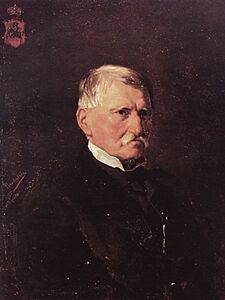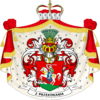Roman Sanguszko facts for kids
Prince Roman Adam Stanisław Sanguszko (1800–1881) was an important Polish noble, a patriot, and someone who worked hard for his country and community. He came from a very rich and famous family.
Quick facts for kids
Prince
Roman Sanguszko |
|
|---|---|
 
Prince Roman the Siberian
|
|
| Coat of arms | Pogoń Litewska |
| Born | 6 May 1800 Antoniny, Russian Empire |
| Died | 26 March 1881 (aged 80) Slavuta, Russian Empire |
| Family | Sanguszko |
| Spouse(s) | Countess Natalia Potocka |
| Issue | Princess Maria Klementyna Sanguszko |
| Father | Prince Eustachy Erazm Sanguszko |
| Mother | Princess Klementyna Czartoryska |
Contents
Life Story
Early Years and Education
Roman Sanguszko was born on May 6, 1800, at his family's home in Volhynia. He was the oldest child and was set to inherit a huge fortune. His family, the Sanguszkos, was one of the richest and most famous families in the old Polish–Lithuanian Commonwealth.
When he was young, the Russian ruler, Tsar Alexander I, made young nobles join military schools. This was to make sure their families stayed loyal. Roman had to join the Russian Imperial Guard. But he soon returned home because he wasn't well. He then went to Berlin and finished university there.
Marriage and Loss
On May 14, 1829, Roman married Natalia Potocka in Warsaw. She was from another powerful family. Sadly, Natalia died soon after giving birth to their daughter, Maria Klementyna Sanguszko. Roman was very sad after his wife's death. He thought about becoming a monk, but then a big rebellion against Russia started.
The November Uprising
In 1830, a major rebellion called the November Uprising began against Russia. Roman decided to join the Polish Army. He fought bravely in several battles, including those at Lubartów and Zamość. He quickly became an officer and, in 1831, he was a helper to General Jan Skrzynecki.
For his bravery, Roman received a special medal called the Virtuti Militari. But in June 1831, Russian soldiers captured him.
Exile to Siberia
Roman was held in a prison in Kiev. He was put on trial for betraying Russia. The court said he was a Russian citizen, not a citizen of the old Commonwealth. He was offered a chance to be pardoned if he stopped supporting the Polish leaders. But Roman refused.
The court decided to take away his noble status and all his property, which was one of the biggest fortunes in the area. They also sentenced him to be sent away to Siberia. To protect his family's wealth, he gave most of his property to his daughter.
On December 18, 1831, Roman was forced to walk all the way to Siberia in chains. This long journey was about 3,300 kilometers (2,050 miles). It took him about 10 months to reach the area of Tobolsk.
Life in the Russian Army
After arriving in Siberia, Roman was made to join the Imperial Russian Army. He was sent to the Caucasus region. There, he had to fight against a rebellion led by Imam Shamil. He served as a regular soldier.
During one fight, he was wounded in the leg. He also had an accident with a horse, which made him lose much of his hearing. Because of his bravery, he was promoted back to an officer. Finally, in 1845, he was allowed to return home to his manor in Slavuta.
Later Life and Businesses
When Roman returned, he left most of his family's property to his daughter. He focused instead on making his land in Slavuta more developed. He started many businesses. Over time, his land became one of the most industrial places in the area.
He opened a textile factory, a sugar factory, a paper factory, a steel mill, and a lumber-mill. He also created a large horse farm that raised racehorses. Roman also made his family's library much bigger. It had over 6,000 books, making it one of the largest collections in the region.
Roman Sanguszko died on March 26, 1881. He was buried in the church crypt in Slavuta. His life story is also told in a short story called "Prince Roman" (1910) by the famous writer Joseph Conrad.
Family
Roman Sanguszko married Countess Natalia Potocka on May 14, 1829, in Warsaw. They had one daughter:
- Princess Maria Klementyna Sanguszko, who later married Count Alfred Józef Potocki.
Roman's younger brother, Prince Władysław Hieronim Sanguszko, also took part in the November Uprising.
 | Madam C. J. Walker |
 | Janet Emerson Bashen |
 | Annie Turnbo Malone |
 | Maggie L. Walker |

